Dear friends,
As promised, today I begin offering a free mini-series of bite-sized articles I hope will help answer the question looming in the hearts of so many in this gloriously awkward era of collapse; What can we do about all this meltdown? It’s all well and good to pick a side and declare what you are for and/or against, but without action, it’s a bit like owning a bunch of maps that show the way to places you have never been. You have to get out the door and actually set sail for said maps to truly be of any use. The tricky part in our situation however is that none of us know exactly where we’re heading. But luckily, there have been some who have navigated similar waters in the past who have generously left us clues. For these essays, I will be borrowing from none other than the great way-finder himself, Siddhartha Gautama, i.e. The Buddha.
Now, the thing about the teachings of Buddha is that they resonate a bit differently with each being. It is said that he taught in 84,000 different ways. The reason for this being that each of us is wired differently. And as such, each of us needs a different set of guidelines, i.e. rules to follow. But what is presented here is not exactly a set of rules per se, as much as thoughtful guidelines, benchmarks, little flags helping us remember The Way. You don’t have to follow them. There is no “right” or “wrong” regarding any of this. It all depends on you. It’s all very circumstantial. Which can be confusion at times, and inconvenient. Only you will know how best to recieve what is offered here. And the only way to know for sure if these methods work, is to try them. You have to be honest with yourself and give it a go.
I have been an activist for over half my life. And I can say without doubt that it wasn’t until I came across these teachings that I really felt I had a clear idea of how best to show up for the beautiful struggle, not with angst, but with an intergenerational determination, rooted in understanding, shrouded in genuine empathy and fueled by skillful means. Before receiving these insights, all my actions, no matter how noble they seemed, merely found me sliding right back into the center of the great samsaric hamster wheel, naively spinning ‘round and ‘round, heading directly towards nowhere fast, wondering why nothing ever worked. Sound familiar?
I invite you to view these Seven Factors of Awakening, as they are often referred to, as little bamboo sticks striking the back of your neck when you get too sleepy, too overwhelmed, too judgemental, angry, whatever. They are like useful slogans we all could benefit from tattooing on the inner, slimy flesh of our eyelids. For we are a forgetful lot and these seemingly simple practices are easily abandoned when more exciting options arise. With regular practice however, these seven vehicles can serve as good elders, patiently enabling us to train our minds in such a way as to prepare us for entry into a more beneficial engagement with the kind of society people like Bernie Sanders, AOC and others are hoping will eventually ripen within the zeitgeist.
We all want to join the revolution. Well, many of us do anyway. But just as the young night in training who, fired up as he is on hormones and a lusty desire for adventure, ought not be given permission to enter the maidens room until he has proven himself worthy, matured enough to know how to properly care for a woman’s heart, received permission from the one he thinks he loves and can prove to the initiated ones that he knows what it is he actually loves (hint; it isn’t her) and therefore won’t harm her, won’t betray her, won’t mistake her for being God… well, we need to know what we are actually yearning for before we set out to liberate the people, lest we turn into another Q-anon shaman. Yikes!
Some of you may recall Jenny’s boyfriend Wesley, from the classic film, Forrest Gump. Jenny and Wesley were depicted as living together in Berkeley, California, during the height of the tumultuous 1960’s when so many social movements were colliding in a well-intended effort to demand systemic changes. Wesley was president of Berkeley's Students for a Democratic Society chapter. He was all fired up for the revolution. He was righteous about his dedication to the cause, proud of his support for The Black Panthers and other civil rights groups. He was angry as all hell at Nixon and every other symbol of empire. But his hatred of “the man” had turned him into a monster. He was convinced he was fighting against the forces of violence that were responsible for the war in Vietnam, the racism against black America, etc. But eventually we learn that he was regularly beating Jenny. His hatred had made him violent too.
I remember my freshman year in university when the twin towers were attacked in NYC. I was probably around Wesley’s age then. I was just starting to blossom as an activist. The whole ordeal had a profound impact on me that would alter the course of my life in ways I am sure were not unlike many students coming-of-age during the sixties. Just as many today can tell you where they were when JFK was shot, I can tell you exactly where I was when the twin towers were hit. But unlike Wesley, my disgust with George W. Bush never turned into rage. I didn’t know it at the time but I have mindfulness to thank for that, for militancy was not seeded in me then, but rather, sati.
As I glued myself to both television and radio in the weeks following the twin towers attack, trying to make sense of everything, attempting to process more information than my young mind was realistically able to do, it was ultimately a speech given by Vietnamese Zen Master Thích Nhất Hạnh, that was shared by Amy Goodman on the legendary alternative radio show, Democracy Now! that shifted my view of “the enemy” away from one of revolution to one of inner transformation and refined empathy.
*You can listen to this speech here:
“Embracing Anger”: Thich Nhat Hanh Calls For Peace In NYC Speech Two Weeks After 9/11
This speech sparked in me a deep interest in contemplative practice, especially those of the Buddhist traditions. I began seeking out more of Thích Nhất Hạnh’s works. I was surprised to learn that the legendary non-violence advocate, Martin Luther King Jr. nominated him for the Nobel Peace Prize in 1967. His story was impressive. In the face of unthinkable tragedy, he remained vigilant not only with regard to his dedication to share with others what kind of world he hoped would eventually rise into view but so too with his determination to actively embody the type of person he knew we all have the potential to be. Above all else, he worked on himself.
Throughout his life, he regularly pointed out to activists that, if we are not careful we can easily become what we fear. He often shared how his inspiration to begin a method of peace activism deemed “engaged buddhism” which intertwined traditional meditative practices with active nonviolent civil disobedience, came from observing his friends, who were good-hearted and wanted to see positive change yet, lacking mindfulness, often became violent themselves. In developing a strong foundation in sati however, the practitioner began to realize that without disciplined dedication to looking deeply within oneself they run the risk of not seeing that by merely being “anti-war”, or “anti-government”, “anti-billionaire”, etc. we are still merely “anti”. And as such we are essentially at war with war, or whatever it is we are in opposition to, which only leads to yet further, you guessed it, war. The irony is deadly. We need more than an awareness of what we hate. We need to become that which is love.
I am sure some of you can relate to Wesley. Maybe you lived through the 60’s yourself and still carry with you some of the understandable rage he felt. I’m sure for some the rage has only escalated. It can be easy, when looking around at the state of the world now to wonder, why the fuck has nothing changed in so damn long!? It seemed like we were on to something! What happened to all the hippies??? All the “Peace, love, dove”? Why did everyone give up, sell out? …Why did we fail?
As far as I can tell, unless we ourselves honestly change, nothing else is going to change either. Change requires change. We all need to get really serious about what this entails. The world we want our children to live in isn’t just going to magically manifest itself because we all OM together at a rally somewhere. We have to recognize that we ourselves are part of the problem and get to work on transforming our view.
The Hippies professed to be anti-establishment but the establishment was actually still in most of them. The over consumption of sex, drugs, rock and roll, energetically not all that different than the desires of empire, mirrors the lust of people like Trump. We want to get what we want. We often define freedom this way. Excess. Hell, look what’s happened to the Grateful Dead recently. It’s business as usual, baby! I love the good ol’ Grateful Dead. You all know that. But let’s be real. Jerry is rolling over in his grave right now. Yet generally speaking, it isn’t always so easy to see this. Without skillful means, slowly we become what we never wanted to be and don’t even know it. To mature enough to make the connection and to know what to do about it, takes real work. It takes, among other things, mindfulness.
The word mindfulness, like so many other great words, has been hijacked in recent years. Thích Nhất Hạnh, the legendary Vietnamese monk who is often referred to as the Father of Mindfulness, gave several direct teachings regarding the topic of mindfulness to people in silicon valley, to Oprah Winfrey, to Google execs, etc. My mom, a social worker in Indiana, even attended a “mindfulness” retreat on a business trip recently. This is great! But mindfulness, as it was understood by Buddha, means something far different than what it has come to be understood as by corporate elites. Whereas most think of mindfulness as simply a method of sharpening awareness, of slowing down, calming the mind and as a result being able to be more efficient, calm and productive, (all true) it actually has more to do with another topic altogether, one we have discussed in my newsletter regularly, and that is memory.
Sati is the Pali word most often used to translate “mindfulness”. It’s literal meaning is to remember or to recollect. Without remembering, we risk getting lost in reactive patterns and unconsciously slipping right back into the cycles of fear and illusion we were hoping to avoid. Without a highly developed memory we can easily forget that we too are a product of the same system that birthed empire, and have been trained to be attracted to the same detrimental forces. And unless we find a way to see this situation clearly enough, any genuinely beneficial transformation within our own lives is unlikely much less any transformation of the greater world around us.
So, what are we trying to remember exactly? A fine question indeed. For those who regularly read this newsletter, you probably recall that I usually write “remember” as “re-member”. There is good reason for this. Ultimately, if we are going to re-align our minds with Right View than we need to bring together again the fragmented aspects of our understanding that have dispersed due to all kinds of trauma, be they ours individually or those we have unconsciously absorbed from our collective society.
We have to re-member Right View. We have to look deeply and be mindful of what is actually around us and why. We have to train ourselves to be aware of how we are sitting at each given moment, how we are walking, where we are walking to and with whom. We have to practice slowing down and paying attention to what triggers us, what attracts us, what makes us feel nothing at all. We have to learn how to penetrate into these seemingly mundane phenomena and ask ourselves… Why?
We don’t need to be good at this. We just have to do it. We have to start where we are and aspire to see deeply.
I offer you an example.
Today I woke early and realized immediately that my back hurts. I breathed deeply and said to myself. “I am aging. My body is not as strong as it once was. I will take care of this body. Life is brief. I will not waste this day.” I then walked mindfully to the kitchen, aware of each step, the way the floor boards felt under my feet. I poured myself a glass of water while considering where the water came from, where the glass came from, how fortunate I was to have access to it, remembering the woman I recently met in India who told me she spent several hours each day searching for water for her family, and I drank slowly, with gratitude. I then stretched and breathed. As I did so, I continued re-membering the awareness of how temporary this body is, how fragile and fleeting it is, how marvelous and useful and capable of doing good. I allowed my mind to reflect how I have been treating it over the years. Sometimes in good ways, other times not so wisely. I considered why. How many people have benefited from this body? How many have been hurt by it? What beings and energies has this temporary bag of bones and blood and flesh consumed? What is it all for? Have I attempted to honor what has given me life? Why? Why not?
Breathing. In. Out. In. Out…
I then went for a bike ride. As I did so, I considered the materials that had all temporarily been brought together in such a way as to allow me to move swiftly over two moving wheels. The rubber tires, which came from the same trees I was incidentally soaring swiftly past, made me reflect over how much rubber we in the modern world use, how different the landscape of Asia and South America is today because of human demand for this useful gift of the forest. Breathing in, I could feel the wind on my skin. I considering the bikes frame, made of chromium molybdenum steel, I recalled how many people in the town I hail from, Crested Butte, Colorado love to ride bikes made from molybdenum, but have been protesting the mining of it from a nearby mountain for decades. How ironic we humans are. How unaware, how forgetful.
I turned on my headphones and listened to a news podcast speaking of Trump and Gaza and Ukraine, a bit about the climate catastrophe, the stock markets, the death of Pope Francis and the tariff war. It all made me feel rage, made me want to fight, made me want to cry. I felt embarrassment at how my countries president showed up so disrespectfully to the Pope’s funeral. I observed in me how disgusted I am when considering how many people in my own native land, some of them my own family members, some my closest friends, willingly voted for this man, a man I deem not only ignorant but borderline evil. I took a deep inhale as I rode my bike, followed by a deep exhale and asked myself, what conditions would need to be present for me to vote for someone like Trump? What would my life have to be like for me to act the way Trump does? Where in me lies the seed of empire, of ignorance, of fascism, of hate?
…..April 19th was International Bicycle Day. If ya know, ya know. ;)
I returned home. The sun now fully risen in the sky. I considered how many people throughout history woke every day for thousands of years, just before dawn to offer praises to the sun, people who viewed this mass of incandescent gas, this giant electrical furnace as a deity, a god, a father, a relative, an animate energetic force with whom we all have a responsibility to engage with ritually. I made a prayer. I offered a pinch of tobacco. I observed my insecurity. I noticed something deep in me feeling both familiar and foreign. I felt mournful for no longer knowing what exactly to do. And mostly, I felt awe. The technicolor display before me now forcing everything in existence to come alive.
I breathed in, aware that I was breathing in. I looked around me and noticed several hornbills and Indian mynas seeming to offer songs to the Sun too. I wondered if they noticed me, if they wondered what I was thinking. Some part of me became aware then, as the rays of sun lit up the canopy, that everything was spilling over. The seemingly compartmentalized sensations we generally take for granted are all woven together and rarely, if ever, belong to just one of us, nor even just one time. We inherit grief and memory. We transmit habits just as easily as genetic code. Looking deeper still, I see the memory of sea creatures in the limestone, currently formulated as concrete. Everything I gaze upon, possessed of a long history, a long herstory, filled with all kinds of… Story.
For a moment I wonder if I can see the sun with my skin. As some other animals can. Can I hear the birds with my eyes? What if this isn’t about this or that, us or them, but rather everything is merely an aspect of eternal becoming, of forever adding on? Not “oneness”, but an animate, ever-evolving interconnection.
Yes, and…
Surya, my daughter wakes, and runs to my side. Suddenly the only thing that matters is making sure she is fed.
Sometimes mindfulness brings peace. Not the kind void of suffering, but a noble understanding of how to hold life’s inevitable losses without losing hope, without forgetting how gorgeous and perfect it all is, how impossible it is to fully comprehend and how enormously lucky we are to be a part of this. But the purpose of sati is far more profound than merely delivering a temporary fix to discomfort. The invitation is to develop a profound ability to re-member, and thus see deeply, in order to grow a capacity to penetrate instantly into all phenomena via a heightened, yet more subtle activation of all senses.
The goal is not to be more productive. Mindfulness can make the practitioner more productive, of course. But when done right, activated sati is a bit like having the rug pulled out from under your feet. Again and Again and Again. Which is a bit distressing, yet eventually offers the kind of well-metabolized peace that comes not from escaping reality but going directly into it and becoming so hopelessly in awe of what is shown that full surrender is the only option, knowing that ultimately, there is nowhere to go and nothing to do. That; There is no way to peace. Peace is the way.
Calligraphy by Thích Nhất Hạnh
…
Ah. The bliss of the ultimate. But we live in a relative world too. We do have places to go, and we do in fact have many things to do. The children have risen. They are hungry. The fascists are rising to power and must be stopped. Yes indeed, ours is not a time where we have the luxury to go meditate on such deep truths from within a cave somewhere in a far off abode of snow. Our time calls for action.
Mid day, when there is a moment to breathe, I pause and recognize how busy life has become. That it often seems utterly impossible to participate in anything more than what is already on the plate. I look deeply into this feeling of overwhelm. I invite him and all his friends, anxiousness, jealousy, anger, fatigue, all the others too, in for a cup of tea. I get to know them. I feed them well. I don’t judge them. I simply listen.
As you make the commute to work. As you take a shit. Whenever you manage to find the time, simply breathe consciously and pay attention. Inhale and exhale slowly. Be consistent.
I have no idea what I’m doing. I smile and acknowledge my exhaustion, that I am sometimes afraid I made a terrible mistake by bringing a child into this god forsaken realm, that sometimes I’m jealous of my childless friends. I learn of the government attempting to convince more mothers to bear children, and laugh aloud. And I weep. And eventually, I release. I forgive. Myself and others. Beauty emerges, subtle and sweet. I love her more than anything in the world…
..…
Breathing in, I know I am overwhelmed.
Breathing out, I acknowledge the need for rest.
Breathing in, I know there must be more to life than what my culture has told me.
Breathing out, I make more space. I re-member my ancestors and bow to them, in gratitude…
…
:::the way out is in:::
I stare into the sun that is in me.
I remember you remembering me remembering you…. and on and on and on.
I remember what Thích Nhất Hạnh once told us, years ago while he still adorned a human body, re-minding us of The 5 Remembrances:
I am of the nature to grow old. There is no way to escape growing old.
I am of the nature to have ill health. There is no way to escape ill health.
I am of the nature to die. There is no way to escape death.
All that is dear to me and everyone I love are of the nature to change. There is no way to escape being separated from them.
My actions are my only true belongings. I cannot escape the consequences of my actions. My actions are the ground upon which I stand.
…
The moon is now new again. The ocean around me feels this clearly. The blood in my veins feels this too. We are 90% water. We rise and fall with the pulse of Moon, in relation with all that is fluid. I align with the natural rhythms of Her.I am not what I think I am and neither is any of this. And yet, the laundry needs to be washed. The corn needs to be planted. The children need to be fed.
Breathing in, I am aware of the Ultimate.
Breathing out, I am completely engaged with what is in front of me now.
…
Suggested Reading:
Buddhism’s “Five Remembrances” Are Wake-Up Calls for Us All
If you could kindly tap the ❤️ at the top or bottom of this newsletter it will make it easier for other people to find this publication. Ahéhee'! བཀའ་དྲིན་ཆེ།! 謝謝! Thank you! ขอบคุณ! شكرا ! תודה! Спасибо! धन्यवाद! Cảm ơn bạn! អរគុណ! Merci y Muchisimas gracias!
#mayallbeingsbehappyandfree

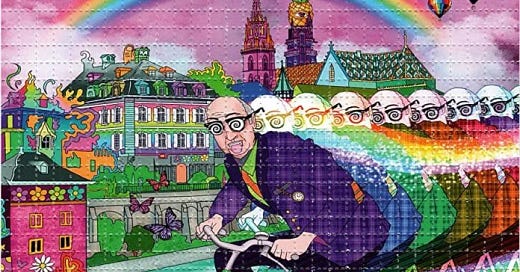


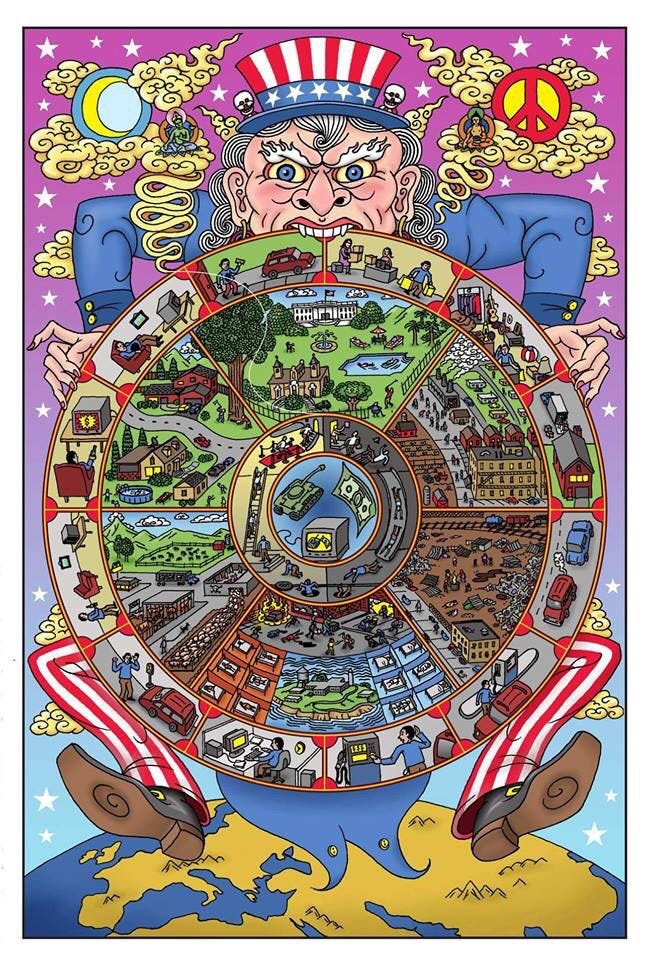
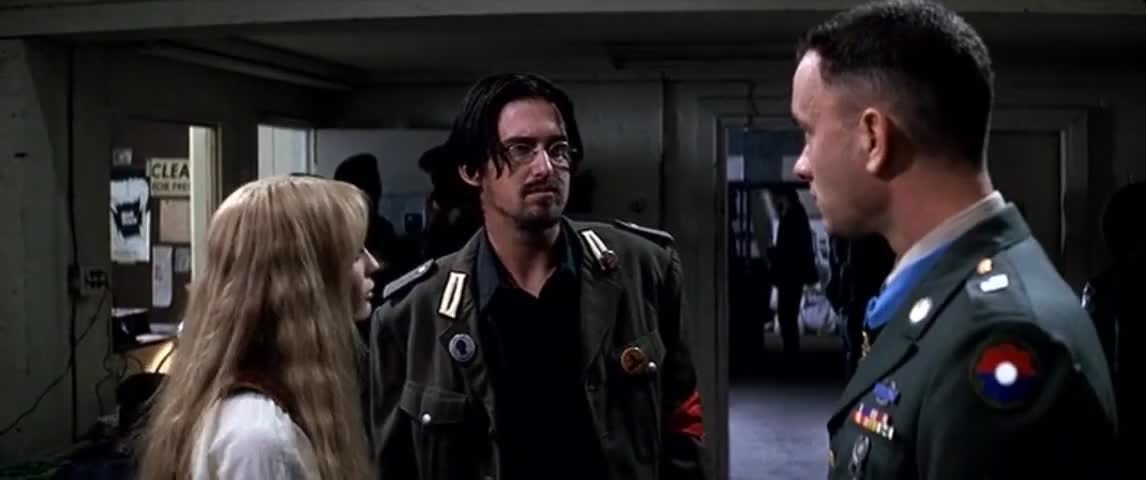
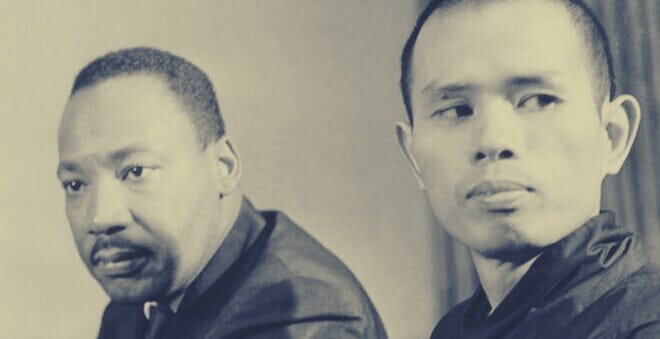
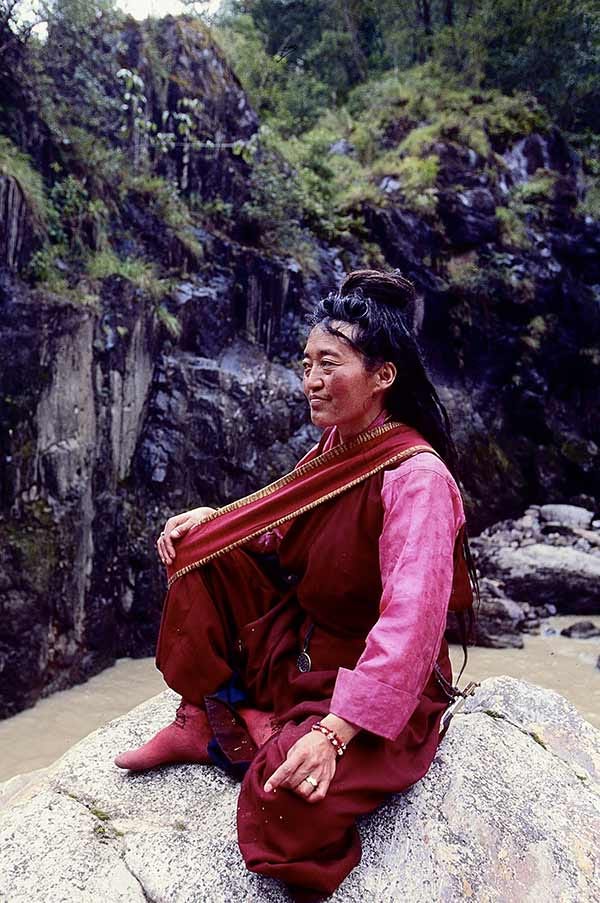
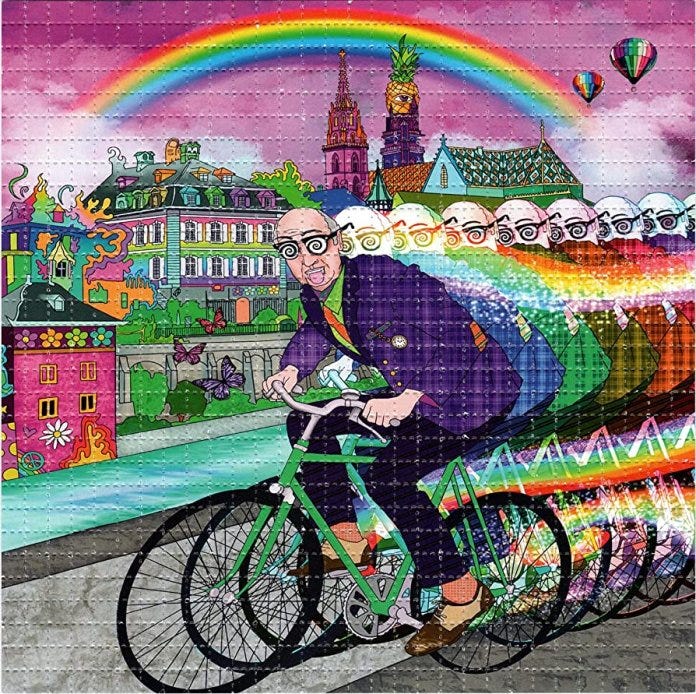
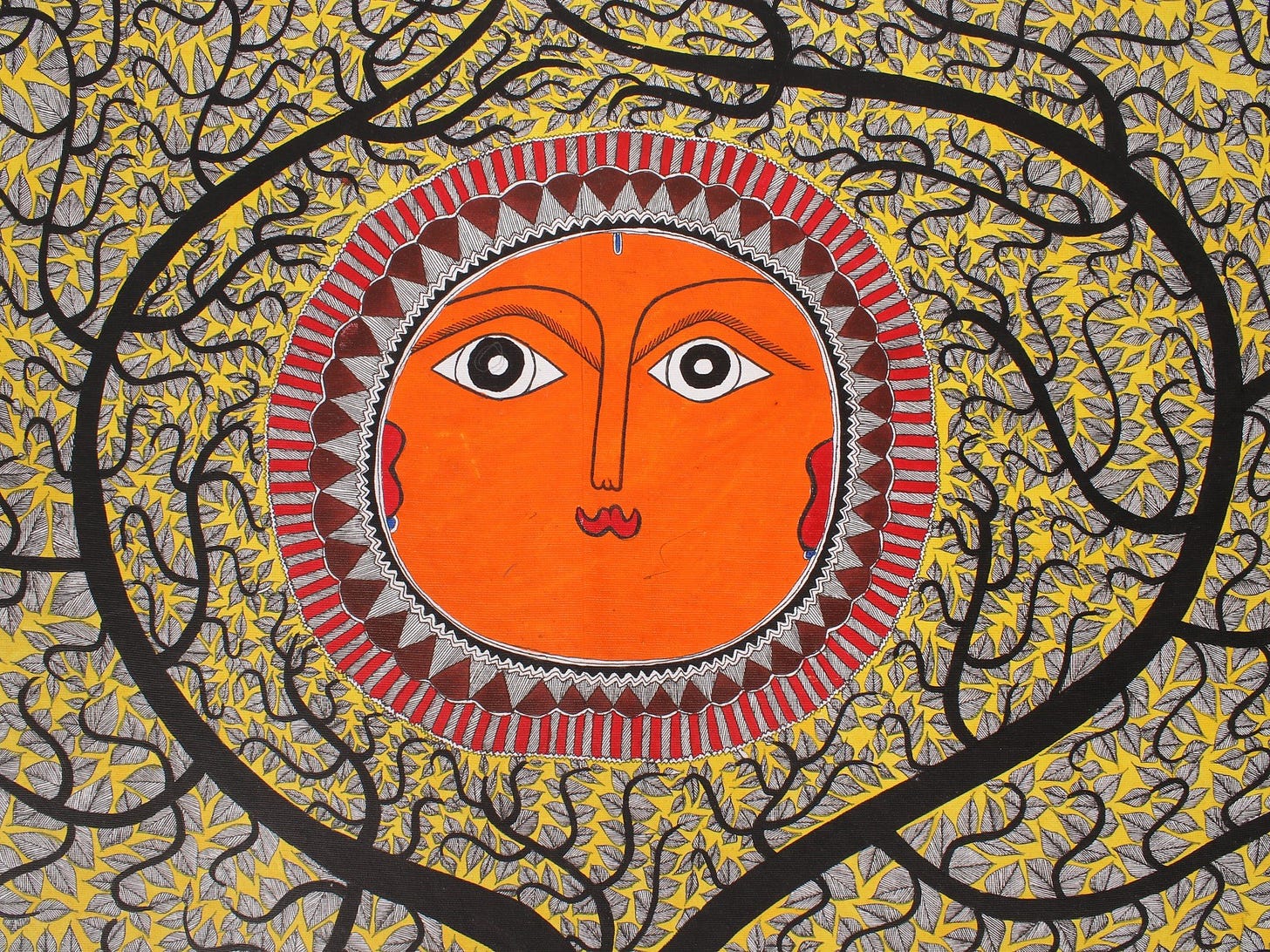
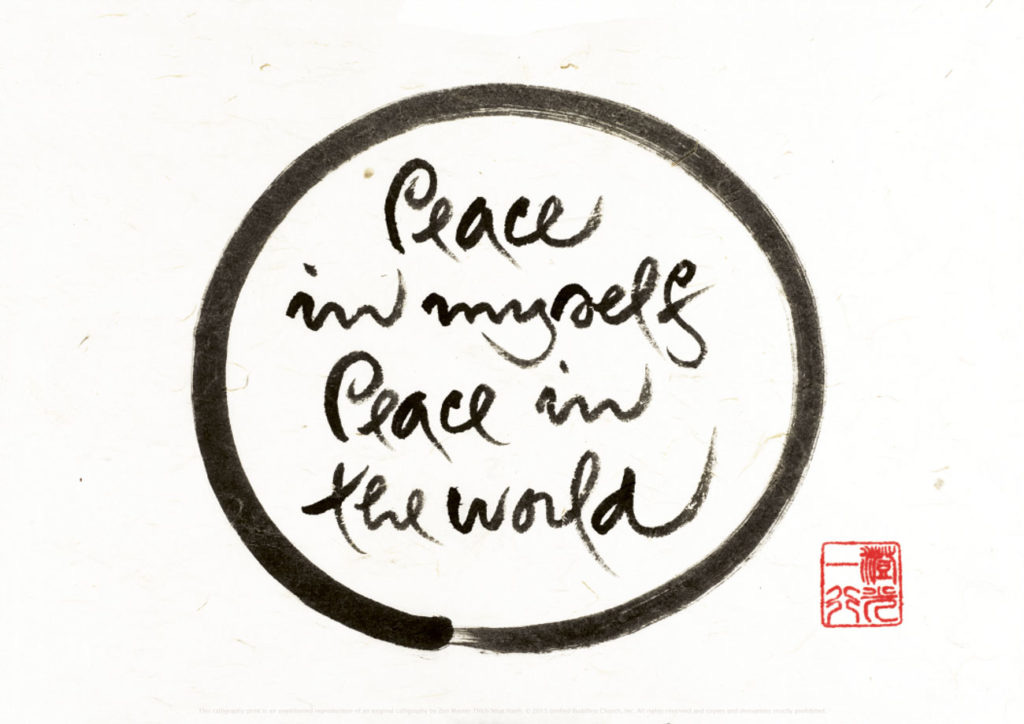
Love this one, Gregory. From Gump to MLK, wonderfully highlighted. By the way, the kids watched Gump for the first time ever. And they said: favorite movie ever. Considering the slew of other movies on warfare, revolution, and changes--superheroes and dramas alike, that's high praise. Take care out there, halfway around the world, Gregory! Say hello to the fam! Cheers, -Thalia
Mm I needed this! Total resonance. That tricky balance. I’ve been coming back into a deep remembering, it’s been so beautiful, and hard. Breath is key.